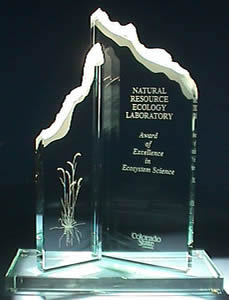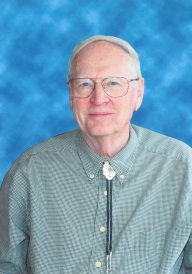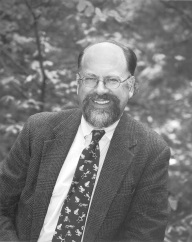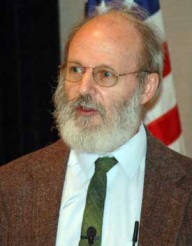Award of Excellence in Ecosystem Science


The NREL Award of Excellence in Ecosystem Science was established by the Natural Resource Ecology Laboratory, NREL, in 1997. It is presented to an individual(s) whose independent and interdisciplinary research has contributed to sustained, innovative syntheses and new insights in the study of ecosystems.
NREL Today: Symposium and Distinguished Ecosystem
Ecologist Lecture and Awards
Thursday, November 20, 2014
Symposium and Distinguished Ecosystem Ecologist Lecture and Awards Ceremony
1:00 - 5:00 PM
Ballroom 350 C, Lory Student Center, CSU
Reception and Poster Session
5:00-6:30 PM
Ballroom 350 D, Lory Student Center
Colorado State University’s Natural Resource Ecology Laboratory will celebrate its history of excellence in ecosystem science on Thursday, November 20 at the NREL Today: Symposium and Distinguished Ecosystem Ecologist Lecture and Awards Ceremony.
The Symposium will showcase past and present ecosystem science research with short talks given by NREL scientists, concluding with a presentation by Guest Speaker and former NREL Scientist, Dr. David Schimel, NASA Jet Propulsion Laboratory.
The NREL Award of Excellence in Ecosystem Science was established by NREL in 1997. It is presented to an individual(s) whose independent and interdisciplinary research has contributed to sustained, innovative syntheses and new insights in the study of ecosystems. The 2014 awardees are Dr. Eldor Paul, NREL Senior Research Scientist and Professor of Soil and Crop Science at CSU, and Dr. William Schlesinger, President Emeritus at the Cary Institute of Ecosystem Studies.
The 2011 Award of Excellence in Ecosystem Science recipient, Dr. Stuart (Terry) Chapin III, University of Alaska, will give the keynote address “Moving from Assessment to Action: Linking Top-down with Bottom-up Adaptation Planning for Global Change.”
A reception and poster session featuring NREL and Department of Ecosystem Science and Sustainability graduate student research will immediately follow - all are encouraged and welcome to attend.
CSU’s School for Global and Environmental Sustainability will also host a coffee social with Chapin November 19 from 9 a.m. to 11 a.m. in Room 108, Johnson Hall. All are welcome to attend. Coffee, pastries, fruit and juice will be served.
The 2014 Symposium and Distinguished Ecosystem Ecologist Lecture - (download program)
For more information about the event email Laurie.Richards@colostate.edu.
2014 Award Recipients:
Dr. Eldor A. Paul
 Eldor A. Paul is a Senior Research Scientist at the Natural Resource Ecology Laboratory and a Professor in the Department of Soil and Crop Sciences at Colorado State University, Fort Collins. Eldor has had a lifelong interest in teaching and research in both grassland ecology and agroecosystems, ranging from wheat fields in Canada, through corn-belt rotations in the Great Lakes region of the US, into the afforested systems in California and Colorado. Prior to coming to Colorado State University, Dr. Paul was Professor of Soil Microbiology and Biochemistry and Departmental Chair in the Department of Soil and Crop Sciences at Michigan State University. He has also served as Departmental Chair and Professor in the Department of Plant and Soil Biology at UC Berkeley, and was a faculty member of Soil Science at the University of Saskatchewan. He earned his M.Sc. at the University of Alberta and his Ph.D. at the University of Minnesota.
Eldor A. Paul is a Senior Research Scientist at the Natural Resource Ecology Laboratory and a Professor in the Department of Soil and Crop Sciences at Colorado State University, Fort Collins. Eldor has had a lifelong interest in teaching and research in both grassland ecology and agroecosystems, ranging from wheat fields in Canada, through corn-belt rotations in the Great Lakes region of the US, into the afforested systems in California and Colorado. Prior to coming to Colorado State University, Dr. Paul was Professor of Soil Microbiology and Biochemistry and Departmental Chair in the Department of Soil and Crop Sciences at Michigan State University. He has also served as Departmental Chair and Professor in the Department of Plant and Soil Biology at UC Berkeley, and was a faculty member of Soil Science at the University of Saskatchewan. He earned his M.Sc. at the University of Alberta and his Ph.D. at the University of Minnesota.
Eldor’s research focuses on the dynamics of soil organic matter and the microbial ecology of soil organisms. His research has involved the use of tracers, such as 14C, 13C, and 15N, as well as molecular techniques for soil organic matter characterization and microbial growth-diversity studies. He has had three editions of Soil Microbiology, Ecology, and Biochemistry published with the fourth edition now in preparation as Managing Editor. The book has been widely read and translated into both Chinese and Korean.
Eldor continues his lifelong interest in nature, people, and knowledge fed by an intense curiosity that started during his first eight years in a one room, log schoolhouse, with all years being taught by the same teacher. This teacher recognized his ever-inquisitive mind and made available to him a large, private library including books written by authors ranging from Dickens and Zane Gray to Mark Twain, in addition to a rich assortment of historical and geographical volumes. Growing up under the clear skies of Alberta with a profusion of stars, northern lights, and a diverse range of bird and animal species, where a cold climate was ever-present, led him to ask, “How does nature work?” This life-long interest and ever quizzical mind about the field of soil science and natural resource ecology drove him to increasing his knowledge and devoting his career to acquiring answers to questions about basic and applied applications in agronomic, ecological, microbiological, biochemical, and biogeochemical, which are still of great importance to the human race today. Eldor also continues to foster his mental and physical capabilities by working at a grassland–forested ranch in the foothills above Ft. Collins.
Among Eldor’s awards and honors received, he is a Fellow of the American Society of Agronomy, Soil Science Society of America, Canadian Society of Soil Science, and the American Association for the Advancement of Science. He has received the Soil Ecological Society Professional Award, the SSSA Soil Research Award, and SSSA F.E. Clark Lectureship Award in Soil Biology.
Dr. William Schlesinger
 William H. Schlesinger is President Emeritus of the Cary Institute of Ecosystem Studies, a private ecological research institute on the grounds of the Cary Arboretum in Millbrook, NY. Completing his A.B. at Dartmouth (1972), and Ph.D. at Cornell (1976), he moved to Duke University in 1980, where he was Dean of the Nicholas School of the Environment and Earth Sciences and James B. Duke Professor of Biogeochemistry.
William H. Schlesinger is President Emeritus of the Cary Institute of Ecosystem Studies, a private ecological research institute on the grounds of the Cary Arboretum in Millbrook, NY. Completing his A.B. at Dartmouth (1972), and Ph.D. at Cornell (1976), he moved to Duke University in 1980, where he was Dean of the Nicholas School of the Environment and Earth Sciences and James B. Duke Professor of Biogeochemistry.
Schlesinger is the author or coauthor of over 200 scientific papers on subjects of environmental chemistry and global change and the widely-adopted textbook Biogeochemistry: An analysis of global change (3rd edition with Emily S. Bernhardt, Elsevier, 2013). He was among the first to quantify the amount of carbon held in soil organic matter globally, providing subsequent estimates of the role of soils and human impacts on forests and soils in global climate change. He was elected a member of The National Academy of Sciences in 2003, and was President of the Ecological Society of America for 2003-2004. He is also a fellow in the American Geophysical Union, and the Soil Science Society of America.
His past work has taken him to diverse habitats, ranging from Okefenokee Swamp in southern Georgia to the Mojave Desert of California, and three times as a Duke alumni tour guide to Antarctica. His research has been featured on NOVA, CNN, NPR, and on the pages of Discover, National Geographic, the New York Times, and Scientific American. Schlesinger has testified before U.S. House and Senate Committees on a variety of environmental issues, including preservation of desert habitats, global climate change and carbon sequestration.
Schlesinger currently serves on the Board of Trustees for the Doris Duke Charitable Foundation (New York), the Natural Resources Defense Council (NRDC; New York), and the Southern Environmental Law Center (Charlottesville).
He and his wife, Lisa, live in Lubec, Maine, where they enjoy birdwatching, gourmet cooking, and coastal life.
Dr. Terry Chapin II, Keynote Speaker, 2011 Award Recipient
 As director of the graduate educational program in Resilience and Adaptation at the University of Alaska, Fairbanks, Chapin studies human-fire interactions in the boreal forest. A professor of ecology in the Institute of Arctic Biology at the University of Alaska Fairbanks (Fairbanks, AK), Chapin was the first Alaskan elected to the National Academy of Sciences. His initial research concentrated on the adaptation of plants to changing environmental conditions and has evolved to investigating the dynamics of socio-ecological systems under changing conditions. Among the honors Chapin has received are the Kempe Award for Distinguished Ecologist in 1996, the Usabelli Award for the top researcher in all fields from the University of Alaska in 2000, and the ESA Sustainability Science Award in 2008. Chapin is former president of ESA and the 2011 recipient of the NREL Excellence in Ecosystem Science Award.
As director of the graduate educational program in Resilience and Adaptation at the University of Alaska, Fairbanks, Chapin studies human-fire interactions in the boreal forest. A professor of ecology in the Institute of Arctic Biology at the University of Alaska Fairbanks (Fairbanks, AK), Chapin was the first Alaskan elected to the National Academy of Sciences. His initial research concentrated on the adaptation of plants to changing environmental conditions and has evolved to investigating the dynamics of socio-ecological systems under changing conditions. Among the honors Chapin has received are the Kempe Award for Distinguished Ecologist in 1996, the Usabelli Award for the top researcher in all fields from the University of Alaska in 2000, and the ESA Sustainability Science Award in 2008. Chapin is former president of ESA and the 2011 recipient of the NREL Excellence in Ecosystem Science Award.